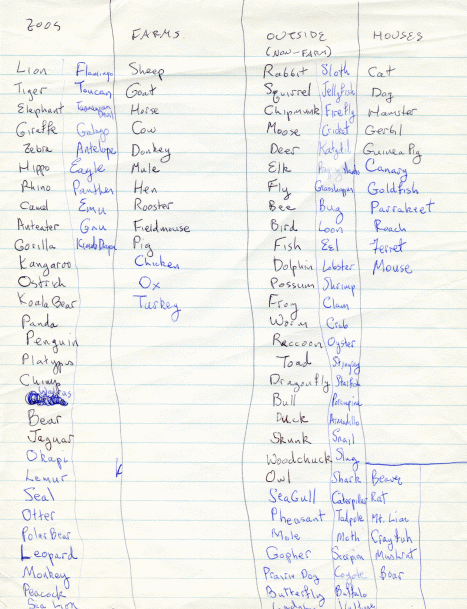I didn’t think anyone would get it. I was completely stumped myself until I got help from my friends. But Neil got it.
In his words, “We have onomatopoeaic words for the sounds made by all of the animals on the right.”
Or, as I prefer to think of it, the animals on the right all have vocabularies (consisting, in most cases, of a single word) while those on the left do not.
A donkey brays, and when it brays it says hee-haw. The donkey makes it to the right of the line not by virtue of braying, but by saying hee-haw. Thus the elephant, which trumpets, but thereby merely makes a noise (as opposed to saying a word) is consigned to the left.
Lions, tigers, and jaguars all roar, but to the best of my recollection from extensive reading (mostly at about age 5), lions and tigers, when roaring, actually say the word “roar”, while a jaguar merely roars incoherently. Chickens say “cheep”. Hens say “buck-buck-buck” (the act of saying this is called “clucking”). Roosters can crow in either of two dialects: Some say “rrr-rr-rrr-rr-rrrrr” while others (who my five-year-old self considered unbecomingly pretentious) say “cock-a-doodle-doo”. Pretentious they may be, but as a scientist, I am here to record the facts, not to judge them.
Regarding some of the side discussions that came up in comments, I have no idea why the count is off at the top of the first column, or whether the jaguar was added at a later time, or if so why.
For the benefit of math_geek, who (in yesterday’s comments) lamented the absence of the okapi, I present another list of about the same vintage as yesterday’s, this time with the columns clearly labeled so that future generations (i.e. us) wouldn’t have to puzzle this one out — and with the okapi well represented:

And finally, I think we should let Andy Kaufman have the last word on this:



…Anglophiles….
I’d be curious to know how this list would compare with analogous lists prepared by people who don’t speak English. Perhaps elephants DO say a specific word — but only to people who speak Swahili. And perhaps dogs only speak to we English-speakers.
I suspect worms are pretty tight-lipped (or tight-whatevered) in many tongues (or may whatevers).
I was sure that Kaufman would start throwing in animals like “okapi” to see what the audience did.
http://www.soundboard.com/sb/Jaguar_audio_Sounds.aspx
@nobody.really: good question, I can say that in Spanish for example a rooster sings ki ki ri kiii (kee kee ree keeeee), a hen says poc poc poc (puck puck puck), a chick goes pio pio (pee-o pee-o), a dog barfs guao guao, and so on.
The rooster is particularly confusing for grade school kids taking Spanish and reading farm storiese, my little girl’s friends question why would animals sound different in different languages, which is a great question.
I am wondering now if the list would match if I make a similar one is Spanish.
Animals speaking Czech: donkey: i-a (eee- uh), horse: ihaha (ee huh huh), dog: haf (huff), cat: mňau (miauww), sheep: beee (baaa), goat: meeee (maaa), rooster: kikiriký (kee kee ree keeee – it seems our roosters speak Spanish :)), a chick: pi pi pi (pee pee pee), cow: bů (booo), and for the curiosity, our family pet ferret Freddy, when excited, goes “kwo kwo kwo”, just like a Czech hen. But the hen speaks onomatopoaeic in Czech, while a ferret does not (oficially).
Thanks, Steve. So what was the organizing principle on the left side? It can’t be “animals without a vocabulary” or you would have just written that, or the list would be endless. The fact that you enumerated both sides suggests a bar bet–“I bet there are more animals characterized by X than animals characterized by vocabulary.” What is X?
What does a Bear say?
Bear says blasphemes… cuz it’s a godless killing machine
Giraffes bleat, Alligators hiss and bellow, hippos, rhinos and moose bellow, and zebra’s neigh, just to mention a few. Sound a bit onomato-whatever to me.
See, e.g. http://en.wikipedia.org/wiki/List_of_animal_sounds
Games and puzzles that require inductive reasoning, like Steve’s animal puzzle, are rare compared to games and puzzles requiring standing deductive reasoning. I remember reading about the card game Eleusis in Martin Gardner’s column in Scientific American.
http://en.wikipedia.org/wiki/Eleusis_%28card_game%29
Gardner also popularized the Patterns induction game.
http://philosophy.lander.edu/scireas/appendb.html
Both games can be used to teach the scientific method.
Oh, my mistake. While I chide Landsburg for focusing exclusively on animal words spoken to English-speakers, others inform me that animals apparently speak different words to different English speakers. I just learned, for example, that a Canadan dog says, “Woof, eh?”
German elephants do indeed have a word.